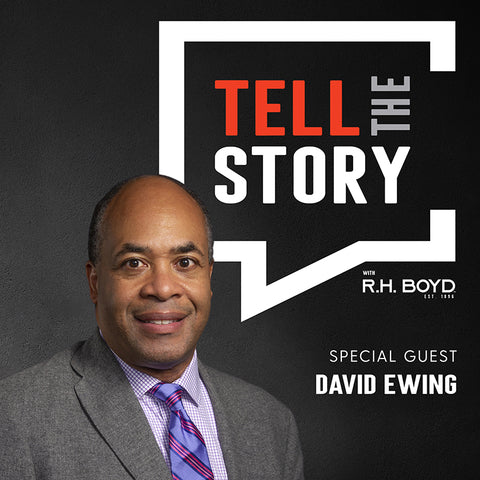No Products in the Cart
- 1-877-4RH-BOYD
Nashville historian David Ewing discusses the legacy of African Americans throughout the city’s history and explains how understanding the past can provide inspiration and clarity into the future.

As a ninth-generation Nashville resident, David Ewing knows first-hand that the Black community has played a vital role in the city’s growth and success throughout history. In fact, Ewing’s great-great grandfather was the first Black lawyer in Nashville, and one of the first graduates of Fisk University.
“Nashville is this great metropolis now that was built on the foundation of Black entrepreneurship, Black social justice, and the Black intelligence community of our historically Black colleges,” Ewing shared. “We need to take credit for that, and we need to inspire more people about that.”
In this episode of Tell the Story with R.H. Boyd, Ewing also explains why stories from the past are so important, and he offers advice to listeners who want to know more about their own family histories.
 |
 |
"Nashville has taken important steps toward celebrating its Black history — such as naming a street after Representative John Lewis and creating the National Museum of African American Music, but the city has a long way to go", Ewing asserts.
Many of Nashville’s Black heroes still go largely unrecognized, like civil rights activist and Freedom Rider Rip Patton, and Josephine Holloway, creator of the first Girl Scout troop in Tennessee.
To understand Nashville’s larger history, it’s also important to recognize the significance of the city’s four Historically Black Colleges and Universities: Fisk University, Tennessee State University, American Baptist College, and Meharry Medical College.
“Nashville has always had a large, educated, Black middle class, since really after the Civil War,” Ewing shared. “And when you think that we have four historically Black colleges... who can say that? That’s really meant a lot to the city and particularly our North Nashville African-American community.”
When explaining why Nashville’s history is so important, Ewing referred to a quote shared by fellow historian John Meacham: “History does not necessarily repeat itself, but history rhymes.”
“Many of the biggest issues in Nashville today mirror problems that people dealt with 100 years ago,” Ewing argued. But instead of feeling discouraged by this, Ewing finds hope in the success stories of people who came before him.
“Yes, we’re fighting some of the same fights that, unfortunately, we still have to deal with, but it should make someone feel strong that 100 years ago, there was a Black business community that was doing great things,” he explained.
Ewing also believes that stories of figures like Rep. John Lewis and Oprah Winfrey serve as an important reminder and even a warning for us today.
“If there was no Nashville, Tennessee and Fisk, maybe there's not a John Lewis. If there’s no Tennessee State University and WVOL and Channel 5, maybe there’s no Oprah Winfrey,” he shared. “If you’re not recruiting at a historically Black college, maybe you’re missing out on the next John Lewis or Oprah Winfrey.”
“One of the best ways to help celebrate history is by learning about the legacy of your own family,” Ewing encouraged.
“A lot of people were under the impression that African Americans couldn’t trace their roots like whites did with DAR [Daughters of the American Revolution] and all these other groups. But Tennessean Alex Haley taught us how to do that,” he shared. “You start off with oral history, talk to your grandparents and great aunts. Ask them about their childhood and tell me about your grandparents and where they came from, and document that. A lot of our history didn’t necessarily get recorded at the time and came down through oral history.”
“We have so much power at our fingertips right now, particularly with social media.” He also encouraged listeners to take advantage of the Internet and social media for learning more and for sharing the stories uncovered.
To learn more about Tell the Story with R.H. Boyd, please rate, review and follow this podcast wherever you listen to your audio content. And to continually feel empowered to tell your own narrative, make sure you follow us on Instagram and Twitter @rhboydco.